AV's Intern Team | August 10, 2014 | No Comments
By Kimber Ray
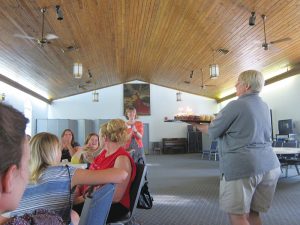
The New Opportunity School sometimes accepts mature women who are under age 30. Here, a staff member carries out a birthday cake to celebrate a student turning 25. She said it was her first birthday celebration. Photo by Molly Moore
Black tendrils of smoke waved into the sky above Richmond, Ky., on a warm day in late June, marking where a careless cigarette butt had been tossed to the ground. When Karla Nunn got a call informing her that flames were engulfing the side of her home, she raced from her job in Berea, Ky., and sped down the rural highway connecting the two small cities, hoping that somehow, her dogs would be okay.
And they were. The fire only had time to damage the outside of the apartment before it was extinguished. It was a silver lining in what had already been a trying month for Karla — she had recently lost both her job as a cashier and her financial aid for school, effectively putting on hold her ambition of obtaining a degree in fashion design and merchandising.
“How successful a woman is, it’s about personal motivation and engagement, plus whatever else life deals them,” says Celeste Collins, the executive director of OnTrack Financial Education and Counseling in Asheville, N.C. “Those life traumas, maybe a fire or losing a job, they’re already tough, but they’re much more of a big deal for low-income women. It helps to have a network when that happens.”
As a 2012 graduate of the New Opportunity School for Women, Karla does have such a network. This three-week residential program — with campus locations in Berea, Ky., Banner Elk, N.C., Bluefield, Va. and Maryville, Tenn. — is dedicated to improving the lives of Appalachian women over age 30 who face educational and economic disadvantages. At no cost to participants, women attend classes in mathematics, writing, computers and self-esteem, participate in paid internships hosted by local community organizations, and receive a free makeover and business clothing.
“This program is more than just three weeks,” says Karla, who applied shortly after the 2011 death of her husband of five years. “I didn’t have any self-esteem before I came here, my husband had me convinced that I couldn’t work. I thought my life was over. These women are my saviors, they’re my second family.”
In the wake of the fire, an unexpected car pulled into sight bringing two very welcome visitors. Lori Sliwa and George Ann Lakes, worried that Karla might have lost everything, arrived to offer embraces and support — they had planned to help Karla replace her computer, clothes and furniture, if needed.
Karla says this recent shake-up in her life is just a “rough patch.” That optimism about her future was not always so quick, but the women from New Opportunity helped Karla challenge her fears. In her mid-40s, she discovered that she had the courage to leave her isolated hometown of Booneville, Ky., population 81, and move to Richmond. She renewed her job search and returned to school.
“[New Opportunity women] realize there’s something more out there,” says Mary Absher, a 2005 graduate from the school. “They may lack work experience or education, but they gain a chance to work on themselves. They discover themselves, and learn they’re smarter and better than they’d thought.”
The challenge of discouragement, low education and underemployment is shared by many southern and Appalachian women. In rural Hillsboro, W. Va., High Rocks Academy for Girls works to address these issues among local junior high and high school girls.
Once accepted into High Rocks, the girls have a wide range of programs available to them throughout the year. They are encouraged to organize volunteer projects in their communities, such as river clean-ups and poetry readings. Small tutoring sessions are hosted once a week, and there is also post-graduation planning support.
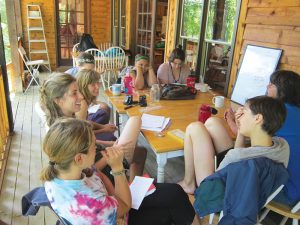
Interns at the New Beginnings camp meet in the afternoons to plan for upcoming days and discuss how to resolve conflicts between campers. Photo by Kimber Ray
But the heart of the High Rocks experience can be traced to the free two-week residential summer camps, which the girls themselves help manage. Rising 8th graders attend New Beginnings and spend half their day in experiential academic classes that emphasize hands-on learning over lectures. Older girls can apply to be junior counselors, or to Camp Steele, which offers several themed academic tracks. Every High Rocks girl attends at least one of the two summer camp sessions and, for most, it starts at New Beginnings.
Fifteen years ago, Renae Anderson saw herself in a very different place than she is today. “Before I came to High Rocks, I had no interest in my future,” Renae says. “My goal in life was to be a waitress and serve food.”
Now 26 years old, she has a degree in Social Science and balances her work as the development coordinator at High Rocks with taking care of her one-year-old daughter. But in many ways, the odds were stacked against her.
In Renae’s West Virginia home state, eight out of ten minimum wage workers are women, according to the nonprofit National Women’s Law Center. And the American Association of University Women reports that “In nearly every line of work, women face a pay gap.”
Add “southern” or “rural” to an average woman’s description and her economic outlook is even worse. Of the nation’s most persistently poor counties, notes the United States Department of Agriculture, an overwhelming majority are rural southern counties. And of those counties, Appalachia and the Mississippi Delta regions have long borne a disproportionate concentration of the nation’s underemployed and undereducated. Women in particular have often found that the road to financial independence is littered with obstacles.
“The Appalachian region has old-fashioned southern traditions,” remarks Mary Absher, a New Opportunity School graduate. “We’re raised and taught to be wives and mothers.”
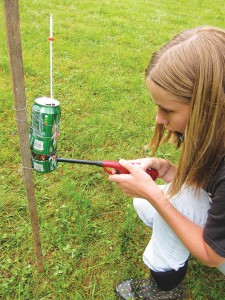
In this science class at New Beginnings, campers conduct an experiment to test the caloric value of foraged plants. Photo by Molly Moore
Traditional gender views may discourage women from entering typically male-dominated fields. But as both High Rocks and the New Opportunity School teach, the solution is not about forcing women into science or construction and banning stay-at-home mothers. It’s about “the girls figuring out who they are instead of who they think they should be,” says Maddie Baker, a junior counselor at High Rocks.
Captain Ken Clark, a Berea Police Department officer, says that throughout the 15 years since the department began hosting interns from New Opportunity, he has seen the program transform women’s self-esteem. “It lets them know that they have worth,” he says, “and that they need to quit listening to people who say otherwise, because look where that got them.”
Recognizing their worth is often a challenge for women, especially those from low-income backgrounds. Rates of depression are approximately 40 percent higher in women, and nearly three times higher for those below the poverty level, according to the Centers for Disease Control. And in everything from education to work and family to social life, countless studies have concluded that depression limits success.
“I thought I was stupid and not able to do anything,” says Karla. “Without this program, I don’t even know where I’d be right now. I might not even be alive today.”
Both the New Opportunity School and High Rocks aim to change that trajectory of low self-esteem and depression that interferes with building a satisfying life. Though they select women from very different stages in their lives, both programs look for the same thing: maturity and the courage to take control of their future.
Since 1996, High Rocks has served more than 250 girls from three main counties in southeast West Virginia. Now a junior counselor at New Beginnings, Casey Griffith remembers how intrigued she was by the High Rocks application when she applied five years ago. “You need to answer deep questions,” she recalls. “Like ‘What is a dream you have?’ or ‘How do you want to change your community?’”
Acceptance to High Rocks is not contingent on income because, as Executive Director Sarah Riley states, “Diversity brings strength to the program.” But nonetheless the girls reflect the demographics of the community: approximately 70 percent of High Rocks girls receive free or reduced-price school lunches as part of a national program for low-income families.
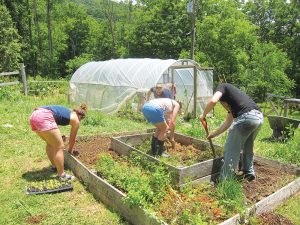
High Rocks girls — and the honorary “High Rocks boy” — maintain a garden that supplies healthy and fresh food for campers’ meals. Photo by Molly Moore
Income and education are, however, key factors for admission to the New Opportunity School. The school has served more than 700 women across Appalachia — none of whom had a college education — since opening its doors in 1987. And with approximately 80 percent reporting a family income of less than $10,000, the majority of attendees are either under- or unemployed.
Debra, who asked not to be identified by her real name, applied to the program after she was laid off from her service job and unable to find new employment. A friend recommended New Opportunity and, when she was contacted for an interview, she was asked what she wanted to accomplish for herself.
“And to be honest,” she says, “I wasn’t sure. But sometimes you need to take a step back from things in order to really get a look at where you’re at, and where you’re going.”
“There’s transformational work you can do when at camp, or on a trip or a journey, that you can’t do when you’re at your house,” says Sarah Riley, executive director of High Rocks. “It’s a different experience to step away from your life while working on defining yourself and your relationships with others.”
At New Opportunity, a trio of women seated at a large U-shaped table debate this same idea over lunch. “It’s tough to be away from my family for so long,” states one of the students. Another woman comments, “But this is the first time I can remember really just focusing on myself.”
Basic math, computer training and punctuation review are among some of the classes at New Opportunity. The school helps the women with professional appearance too, teaching professional etiquette and offering a free outfit from the donation-supplied clothing boutique. After the women graduate, the boutique is always open to them, and one of the staff members keeps a close eye out for new job openings to share with the alumnae.
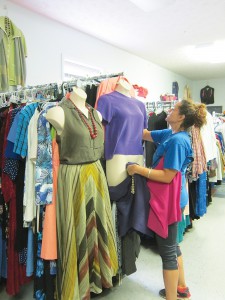
A volunteer at the New Opportunity School’s clothing boutique arranges a mannequin display. The boutique supplies the school’s graduates with free business appropriate outfits, and also employs graduates from the program. Photo by Molly Moore
Maya Todd, a front desk agent with Berea Tourism, works with one of the interns from the New Opportunity School. “She was so quiet when she came in,” Maya says. But by the end of the program, the intern was confidently bustling behind the desk, and even asked her coworkers to listen as she practiced her three-minute graduation speech.
“It’s not that she didn’t have the skills,” Maya notes. “She just needed the encouragement and the opportunity. She’s perfectly capable of answering phones, doing some office work and learning to use the computer.”
The school begins undertaking this transformation of confidence even before the women arrive for the program. Attendees are mailed a bundle of books with themes that relate to their own heritage and struggles — books such as “The Tall Women,” by Wilma Dyke, which explores the strength of Appalachian women. New Opportunity Office Manager Susan Jordison says the school wants the women to realize that “it’s okay to be proud of their culture,” which has been historically associated with a wide array of stereotypes, such as “hillbilly,” “backwards,” and “needy.”
Female and Appalachian identity is also cast in a new light by professional women from the region who visit to speak with the students at New Opportunity. But there is one woman in particular who remains in everyone’s memory the longest — and not just because she works part-time in the school’s office. Her name is George Ann Lakes, and she’s a ‘92 graduate from the New Opportunity School.
In defiance of biases based on age or background, George was 45 when she earned her GED and enrolled in the New Opportunity School. By the time she was 61, she had earned her Master’s degree in Social Work. Many at New Opportunity connect to her story of tenacity.
Hanging on a wall in one of the school’s classrooms are quilts composed of about a dozen squares, each tile telling the story of the woman who made it. One is from Karla’s 2012 class, who named themselves “the phoenixes” since “We’ve been rising out of the ashes pretty much all our lives.” Every class makes a quilt together and, during the program’s storytelling component, the women share their stories of endurance — the experiences that led them to New Opportunity School.
Afternoons at the High Rocks New Beginnings camp are a time devoted to art, dance, hammocks and conversations exploring self-identity. As they rock beneath the trees or stretch out on the grass, the girls take time to reflect and write in their journals. Many have a lot on their mind, since journaling is scheduled right after “Girl’s Group.”
Participants might explore everything from their hopes for the future to their opinions on abortion. “It’s a place to say what they honestly think,” explains Development Coordinator Renae Anderson, who helps organize the collective meeting of staff, campers, junior counselors and interns. “And there’s no wrong answer,” Renae adds.
Finding the level of comfort and trust to share their views with one another can be a difficult task, but is well worth the effort. High Rocks staff member and alumnae Hannah Ormsbee-Walker comments “Before I came here, I didn’t talk much or have an opinion. I had no leadership skills.”
Today, Hannah is serving her second year at High Rocks through the national service program AmeriCorps, which helps provide a living stipend for individuals to work at nonprofits and public agencies. She helps coordinate High Rocks programs and acts as a mentor. “Seeing these girls, and how they weren’t afraid to be themselves, it helped bring me out of my shell too and not have others’ opinions rule what I do,” she says.
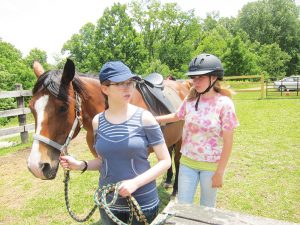
“It’s about more than riding, that’s for sure,” explains Nancy Williams, an instructor for the “connected riding” horse class at High Rocks, where the girls learn to be aware of body language. “If we can’t get the lesson through verbally, the horses do it in a non-verbal way.” Photo by Molly Moore
As campers grow confident in the right to their own opinions, they also become more comfortable with being assertive and standing up for themselves. The girls help manage all levels of the camp, and daily chores range from litter pickup to cleaning the outhouse. But, especially among the newest campers, shared spaces may be treated carelessly.
During dinner, one of the girls stands up to make an announcement: “Stop leaving your trash in the shower house. This is our camp and we need to respect it.” Asked if she would have felt comfortable making this demand from a group before she came to High Rocks, she replies “No.”
Girls also discover their capabilities in the experiential classes, which encourage them to actively engage, question and problem-solve. The New Beginnings classes cover math, science, creative expressions and “Connected Riding” on horses, which teaches girls to heed non-verbal cues in order to ride a horse without stirrups.
From a table set up on a sunny field, the New Beginnings science class is using leaves to delay the chemical reaction between vinegar and baking soda held in film cannisters. Pop! As the chemicals meet, the lid shoots across the grass, demonstrating an acid-base chemical reaction. Erica Marks, a science teacher at High Rocks for eight years, says many girls who are now pursuing a science major tell her they attribute this decision to her summer camp classes.
The Junior Counselors at High Rocks have their own class — an intensive writing course — in addition to their responsibility to help manage the camp. But the full extent of their job lasts the entire day. “We have to hang out and deal with the girls, we can’t just hang out with each other,” comments one junior counselor. “So we learn to deal with the girls on a professional level, and to be a mentor and role model.”
After high school, planning support is available to help the girls set long-term goals and, if that goal is college, High Rocks assists with SAT preparation and school applications, and also takes small groups on regional college visits. Staff member Renae was active in High Rocks throughout high school, and she says the program helped her get into college. But after Renae had finished her degree, during the economic downturn, she was working at a local gas station.
“When did you get back into town?!” was the first thing that Executive Director Sarah Riley exclaimed when she ran into Renae. The second was “Come work with us!” and so Renae applied for an AmeriCorps position. She was accepted and, after serving for two years, Renae was hired into her current position. If not for the continued support and encouragement that she received from High Rocks, remarks Renae, “I don’t think I would have opened my eyes to all these opportunities out there.”
Methods to track success in the two programs are variable, but in surveys conducted after each residential session the women consistently rate their experience highly. In end-of-camp evaluations from High Rocks, all the girls say the summer camp was transformative, and 68 percent find math and science more engaging, and learn more at the summer camp than they do in school.
New Opportunity women also report improvements in math, with the recent class of 15 women rating the helpfulness of the math class an average of 4.5 out of five. More broad end-of-session evaluations are unavailable from New Opportunity. The four campus locations currently do not pool their data and, until a fire destroyed the initial Berea school building in 2011, these evaluations were only maintained as paper copies.
The school does have extensive data on graduates, who are surveyed every two years. After repeated calls, New Opportunity’s most recent 2012 survey of all available graduates had a response rate of 36 percent. Among those who respond, the school has achieved remarkable results.
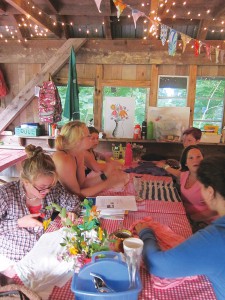
This informal craft activity guided by a New Beginnings camper is an example of the High Rocks holistic education experience where, as Executive Director Sarah Riley says, “To be educated is to be a thinker, a dreamer and a doer. And we don’t have enough adults in the world who are all three of those things at once.” Photo by Kimber Ray
Approximately 80 percent of New Opportunity graduates complete some form of continuing education, and the same number confirm current employment or school enrollment. More than 80 percent report improved personal circumstances and self-esteem. At High Rocks, staff did not disclose how data is collected for graduates, but report that 86 percent of their graduates go on to college, while the remaining 14 percent join the military, take a gap year, or work to earn money for college.
Maintaining funding for these types of programs is a major struggle. “We have a business model that doesn’t work, because it’s free,” says High Rocks Executive Director Sarah Riley. “The better we are at our job, the more demand there is for our services, the less resources we have.”
She notes a similar program in West Virginia, the Lincoln County Girl’s Resiliency Program, that was highly successful from 1997 to 2007. After receiving a large grant, the program neglected to diversify its funding and shut down during the economic downturn.
Both High Rocks and the New Opportunity School have been able to support a diverse set of funding. In 2012 alone, the Appalachian Regional Commission awarded New Opportunity $125,000, while groups including the Women’s Fund of East Tennessee and Oprah’s Angel Network have also bestowed sizable donations. This past year at High Rocks, the Commission for National and Community Service awarded the program a competitive $200,000 grant to sponsor and train AmeriCorps members, and the program has consistently received tens of thousands of dollars from West Virginia’s county and state agencies.
Providing data to prove success and attract funding can be challenging, because some measures of success are more difficult to record. “The program’s not just about going to college,” states Renae. “It’s about if you are setting a goal for your future that you really want, and then you’re making that future happen.”
The Appalachian Regional Commission noted this challenge in a 2004 report analyzing the success of programs — including New Opportunity — in empowering and transforming struggling communities. And as is the case today, low response rates from graduates were a problem for staff. Beyond unachieved contact, the commission noted that failed goals stemming from poor health and depression left some women reluctant to answer the survey. Quoting a staff member from the school, the commision wrote “‘We all want to talk about our successes — but not our failures.’”
Yet despite the difficulty of quantitatively capturing some outcomes, the commission and other funders believe in the worth of these programs. At both High Rocks Academy and the New Opportunity School, women continue to attest to the progress they’ve experienced, eager to share their stories of transformation.
“How empowered they feel, to realize they’re worth something and their opinions matter, that’s something that you can’t really measure,” Sarah says. “But once that happens, they’re infinitely more likely to achieve success.”
This story was made possible in part by funding from the Solutions Journalism Network.
Like this content? Subscribe to The Voice email digests